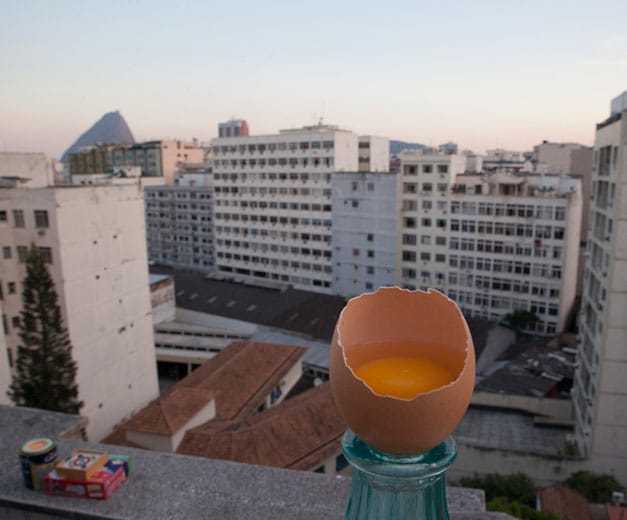You are motionless, stuck in a traffic jam after a long day at work while your stomach growls. You know the rest of the family will be hungry when you get home and that the fridge is empty and sad. Shopping and cooking is out of the question, so you turn onto a Vera side street, zig-zag through one-way lanes to Tatishvili Street, double park, and run into a tiny gastronomic oasis that has been saving lives like yours for nearly a decade. Its name is Tartan.
Located in a step-down ground-floor apartment, takeout cafeterias don’t get homier than this. The front room is taken up with a long counter of refrigerated display cases half filled with enough ready-made dishes to lay down a feast when you get home. The other half offers a diabetic’s nightmare of cake selections that make old cavities ache just browsing through the glass. Two small four-top booths in the corner provide the only seating for those who can’t wait until they get home to eat.
There are other cafeterias in the city that offer pre-cooked meals by weight but Tartan is no mere takeaway. It is a neighborhood institution dedicated to preparing homemade food with a grandmother’s touch, where quality and consistency are taken seriously.

The kitchen is segregated by task throughout the rest of the apartment’s rooms, which are decked out in gleaming stainless steel counters, sinks and shelves – khachapuris and stuffed breads, hot food, salad prep, and storage. Meanwhile, desserts are baked in a separate space across the street.
“We are the customer,” says co-owner Julia Chachiashvili, who also holds a 9-5 office job and has no time to cook, like many of her clients.
Her partners, Nana Zurabashvili and Zaza Tsibadze, manage the daily operations. Fifteen years ago, they opened a neighborhood grocery together. Their winning partnership resulted in Tartan, a busy eatery for working people.
“It is a two-family business,” Julia says proudly. Most of the staff have been here since day one, bringing their own family recipes, some passed down generations on yellowing notepaper, to the menu.
“Everything here is homemade. It is different than what you get at restaurants,” Julia explains.
In fact, some of these grandmother standards are rarely found in Georgian restaurants.
In fact, some of these grandmother standards are rarely found in Georgian restaurants. We have yet to come across anything close to their tender chicken roulade, which is packed with a buttery filling of garlic, onion and red pepper. Dolma are stuffed grape leaves by most standards, but at Tartan they are actually Slavic golubki – cabbage leaves heartily stuffed with meat and rice.
Cabbage also figures in a crispy oil and vinegar coleslaw. Other fresh salads include wooden mushroom with white onion and fresh herbs, and pkhali with ekala – a wild green Tartan freeze-dries to use throughout most of the year. More conventional is the shredded chicken salad, which holds back on the mayo drenching that’s more commonly used.

Cakes and pastries are another Tartan specialty. Georgia is not known for its desserts and few bakeries seem to have the knack of making the kinds of cakes you want to come back for. Powdered milk plays heavily in most pastry kitchens, but Mr. Tsibadze gets fresh milk daily from his neighbor’s cows. It is used for Bird’s Milk cake, a seductively light mousse of whipped sour cream topped in a perfect layer of chocolate. Julia recommends the “Snickers” cake, a toothsome combination of peanuts and chocolate. She blames desserts like these for an extra 10 kilos she didn’t have before opening the cafeteria.
Five bakers work a ten-hour shift to make khachapuri and other stuffed breads like lobiani (bean), mushroom, and tarragon and rice. The layered penovani khachapuri might clog a few arteries, but the way it melts in your mouth is worth the risk of a stroke.
The only problem with Tartan is its own good fortune. Being popular means being busy, and in Tartan’s case that means customers must wait in line. Georgians do not queue well. “Why should I wait behind someone ordering a family meal when all I want is a single khachapuri?” is a refrain we’ve heard here. There is some line jumping but your perseverance will be rewarded, even if all you’re waiting for is an 80-tetri (25-cent) lobiani bun.
The tendency for many entrepreneurs who achieve such success is to expand and be a chain venture, but Julia and her partners are not interested. “Running a place like this is really hard work. It runs smoothly,” she says before greeting a regular customer with a smile. “Why should we over-extend ourselves?”
 December 29, 2017 To Laini
December 29, 2017 To Laini
The name of To Laini, a traditional-style kafeneio (a café that also serves food) […] Posted in Athens November 3, 2017 CB on the Road
November 3, 2017 CB on the Road
We boarded a train in Turkey’s kebab capital of Adana and headed an hour west to the […] Posted in Istanbul, Street Food Masters February 14, 2014 Rio’s Food Idioms
February 14, 2014 Rio’s Food Idioms
You are what you eat, as the saying goes. Is it any surprise then that food figures so […] Posted in Rio
Published on November 18, 2019
Related stories
December 29, 2017
AthensThe name of To Laini, a traditional-style kafeneio (a café that also serves food) specializing in Cretan cuisine, hints at what type of night one will have at this cozy spot. The word “laini” derives from ancient Greek and is widely used on Crete and the Cycladic islands to describe the small ceramic pitcher used…
November 3, 2017
IstanbulWe boarded a train in Turkey’s kebab capital of Adana and headed an hour west to the calm, palm tree-lined coastal city of Mersin with one thing on our minds: tantuni. While available at a number of recommendable establishments in Istanbul and other Turkish cities, tantuni in Mersin exists on a different plane of existence,…
February 14, 2014
RioYou are what you eat, as the saying goes. Is it any surprise then that food figures so largely in popular culture all over the world? In Rio, food and culture go hand in hand like Romeu and Julieta (for Brazilians, that refers to white cheese and guava paste, respectively, which are such a tasty combination…



















































































